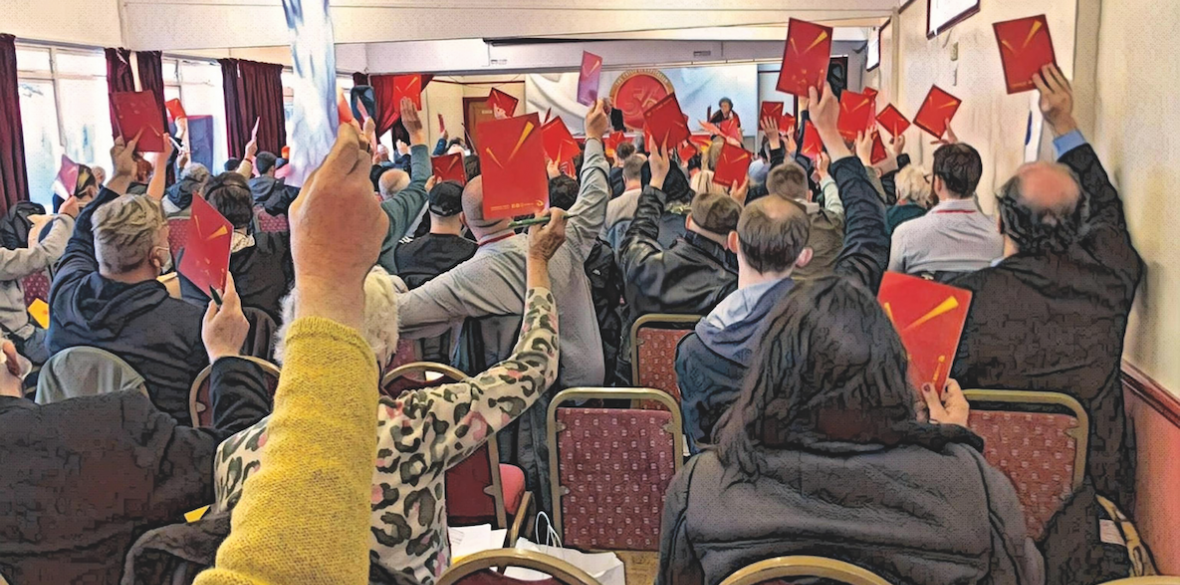This is the last article you can read this month
You can read more article this month
You can read more articles this month
Sorry your limit is up for this month
Reset on:
Please help support the Morning Star by subscribing here
ON November 4-5, delegates from every corner of Britain will gather for the 57th nationwide congress of the Communist Party. The biennial gathering is a significant event in party life, but it is not always well understood and even delegates may find it overwhelming if attending for the first time.
What is the congress? What does it do? Is it just a rubber stamp for the party leadership? I’ll attempt to answer some of the most common questions here and cover the most important things to know.
Let’s start with the rules, which state: “The supreme authority of the party shall be the all-Britain congress and shall be responsible for the adoption of the policy of the party.”
Congress is the party’s supreme decision-making authority. Not any leader, not even the party’s executive committee can override its decisions. What congress decides, goes. Why? Because it is the ultimate democratic expression of the will of our membership.
We don’t do U-turns, make and break pledges, silence our members and we don’t have leaders who can ignore rules or the democratic will of the party.
The principles of democratic centralism lie at the heart of everything we do and congress is democratic centralism in action.
Congress is lay-led. Its agenda, arrangements and rules of debate are all set by delegates, as are the elections it convenes for the party leadership.
The delegates select, and elect, the party’s executive committee in a completely transparent manner. The executive is responsible for setting the direction of the party’s work and for implementing its policies between congresses.
The resolutions that congress passes commit the party to political and organisational objectives, set campaign priorities and govern our relations with other progressive movements and communist parties around the world.
So how does congress work in practice?
As required by our rules, every two years, the executive must convene congress.
Each party branch, district, and nation elects delegates to congress based on its membership numbers and any member can be elected.
Delegates run every aspect of congress, with committees of delegates managing and overseeing the debates and elections.
All delegates have the right to speak in debate (they only need to submit a speaker’s slip asking to be given the microphone), take part in any commissions arranged for congress and make representations to congress committees.
Delegates debate and vote on proposed resolutions and amendments to the party constitution. Hundreds of motions and amendments will be discussed in lively debates.
The retiring executive is dissolved at the opening of congress and its members cannot take part in any of the voting unless they are full delegates. Branches, district and national committees may nominate any party members as candidates for election to the new executive, the appeals committee and as auditors, and any member can put themselves forward.
The elections preparations committee helps to draw up a list of what it believes will be a balanced executive, ensuring representation for minorities and those out of work and aiming for at least 50 per cent to be women.
On the final day, delegates get to vote for a new executive and the results are announced in the final session.
The motions debated at the 57th congress will reflect the diverse challenges faced by working-class communities and will be shaped by the rising tempo of struggle against the cost-of-capitalism crisis.
Out of this experience and desire for change, delegates will be voting for policies that can speak for all workers and lead the way to real social change.
Congress will be attended by representatives from invited communist and workers’ parties around the world, while other workers’ parties and organisations in Britain will also send representatives.
The question of how to forge a united front will dominate this congress as we seek to build a force capable of rolling back the ruling-class offensive.
Of special concern is the question of peace and how to win the battle of ideas on the challenge posed by the war in Ukraine and the new cold war being waged by imperialism against China.
At home, the working class of Britain are facing ruin from an endless cost-of-living crisis and incessant attacks on workers’ rights.
Meanwhile, workers overseas are losing their homes, health, dignity and lives to imperialist wars, exploitation and the effects of climate breakdown.
All this for profit.
Our party is once again growing in strength and confidence and we are ready to provide the direction, voice and leadership the working class needs to face the future with unity and strength. We encourage Morning Star readers to follow our congress as it is reported and to feel free to write to the party with their views.
Will Dry is a theatre worker and part of the Communist Party’s congress communications team.








